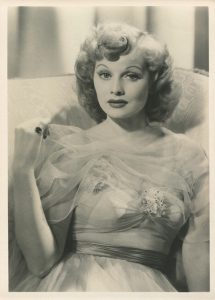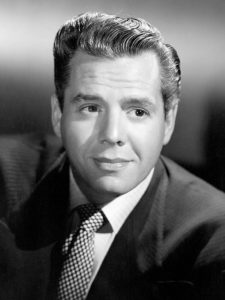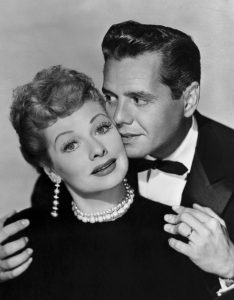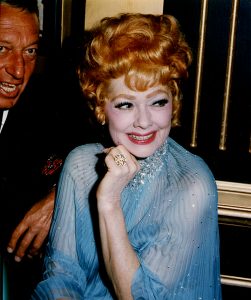As pioneering artists and industry leaders, Lucille Ball and Desi Arnaz shaped our cultural heritage and charted a course for American entertainment history. Known as the “First Couple of Comedy,” Lucille and Desi were innovators behind the scenes, risk-takers in business, and masters of the comedic craft. Together, they revolutionized the broadcasting industry with the creation of the beloved and groundbreaking sitcom I Love Lucy, and the founding of Desilu Studios—one of the most innovative production centers in Hollywood history.
Born and raised in Jamestown, NY, Lucille Ball was determined to pursue a show business career from an early age, making her way to New York City at 15 to study drama and modeling. Despite early setbacks, her relentless drive and incomparable talent led to Hollywood success when she went on to appear in over 100 films before launching her broadcast career in 1948 as the star of the popular CBS radio sitcom My Favorite Husband.
Desi Arnaz was born of privilege in Santiago, Cuba, but lost everything when the Batista revolution forced him to flee to the United States as a young refugee. Desi’s musical talents led to his becoming a breakout star at premiere night spots in New York City and introducing the Conga dance craze to America. A leading role in the Broadway musical Too Many Girls led to Desi being cast in a 1940 Hollywood film adaptation. He met his co-star and future wife, Lucille Ball, on set at RKO Studios and a legendary creative partnership was born.


When I Love Lucy premiered on CBS on October 15, 1951, it changed the face of television in countless ways. For all its beloved physical comedy and expert story-crafting, I Love Lucy was equally notable for representing the first interracial marriage on network television and presenting the first woman to appear pregnant on one of the three major networks (despite not being allowed to say the word “pregnant” on the air). Behind the scenes, led by Desi’s prowess and creativity, the series perfected the use of multiple, simultaneously filming cameras before a live audience—an innovative production technique still employed today. It was also among the first TV shows shot on 35 mm film, which led to the now-commonplace concept of rerun syndication. I Love Lucy was the first comedy to reach #1 in the Nielsen ratings—becoming America’s top-rated show within six months of its debut and charting an unprecedented 71.7 rating/92 share at the height of its popularity. I Love Lucy has never been off the air since its first broadcast over 70 years ago.


At its peak, Desilu Productions was the largest and most prolific independent production studio in the world, with three studio lots and 33 sound stages. With a uniquely independent spirit, a bold creative vision, and the courage to take big risks, Desilu’s television programs pushed social and cultural boundaries and brought to life some of the most beloved and successful TV series of all time, including Star Trek, Mission: Impossible, The Untouchables, The Lucy Show, Mannix, and the original pilot episode for The Twilight Zone, while also serving as the production hub for dozens of beloved television series including The Andy Griffith Show, That Girl, and The Dick Van Dyke Show.
In 1962, Lucille Ball bought Desi Arnaz’s interest in the company and became the first woman to preside over a Hollywood studio. Her leadership successfully steered Desilu into the evolving media landscape of the 1960s. Lucille Ball was the recipient of a Kennedy Center Honor, a Presidential Medal of Freedom, 4 Emmy Awards, and was part of the Television Academy Hall of Fame’s inaugural class of inductees.
Lucille and Desi’s work and enduring legacies are proudly presented and preserved in Jamestown at the non-profit Lucille Ball Desi Arnaz Museum, which opened in 1996. In 2018, the museum’s mission was broadened with the opening of the award-winning National Comedy Center, the nation’s official cultural institution dedicated to the art form of comedy, which operates in fulfillment of Lucille’s vision that her hometown become a destination for the celebration of comedy in all its forms. Visitors are inspired, educated, and entertained at both museums, as well as at the annual Lucille Ball Comedy Festival, which has presented educational programming and performances by rising artists and comedy legends for over thirty years.